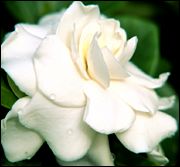One of the longest nerves in the body is known as the vagus nerve (VN). The VN is the 10th pair of cranial nerves that originates at the brain stem in the medulla oblongata. This nerve is part of the parasympathetic nervous system, which is a part of the ANS. Research suggests ear acupuncture can activate the VN.
Herbs & Botanicals
Gardenia (zhi zi)
What is gardenia? What is it used for?
Gardenia is a popular ornamental shrub found worldwide; there are more than 200 varieties in Asia and Africa alone. The shrub consists of glossy, deep green leaves; white or cream flowers that turn yellow as they age; and orange-colored berry-like fruits that contain a sticky pulp.
The flowers contain a distinct, pleasant odor. The fruits are used in most herbal preparations. They are harvested in autumn and winter, and used either raw or after being fried and parched.
 According to the principles of traditional Chinese medicine, gardenia is bitter, cold and dry, and acts on the Heart, Lung, Stomach and Triple Warmer (san jiao) meridians. It purges heat; dispels damp heat; disperses fire; and cools blood. In Western medical terms, gardenia lowers the blood pressure, and is effective in stopping bleeding and treating insomnia, delirium and urinary tract infections. Gardenia also has mild antiseptic properties. Topically, gardenia relieves swelling and bruises due to trauma, and can alleviate pain associated with some sprains and abscesses.
According to the principles of traditional Chinese medicine, gardenia is bitter, cold and dry, and acts on the Heart, Lung, Stomach and Triple Warmer (san jiao) meridians. It purges heat; dispels damp heat; disperses fire; and cools blood. In Western medical terms, gardenia lowers the blood pressure, and is effective in stopping bleeding and treating insomnia, delirium and urinary tract infections. Gardenia also has mild antiseptic properties. Topically, gardenia relieves swelling and bruises due to trauma, and can alleviate pain associated with some sprains and abscesses.
How much gardenia should I take?
The typical dosage of gardenia is 3-12 grams per day, used in a decoction. Gardenia may also be applied directly to the skin.
What forms of gardenia are available?
Gardenia is available as a powder, cream or decoction. Gardenia fruit may also be ground into a poultice and applied to the skin.
What can happen if I take too much gardenia? Are there any interactions I should be aware of? What precautions should I take?
The American Herbal Products Association has given gardenia a class one rating, meaning that it can be consumed safely when used appropriately. However, because gardenia may lower blood pressure, it can increase the effect of anesthetics and negate the effects of hypertension medications. It should also not be used in cases of loose stools or loss of appetite due to cold.
As always, make sure to consult with a licensed health care provider before taking gardenia or any other herbal remedy or dietary supplement.
References
- Bensky D, Gamble A. Chinese Herbal Medicine: Materia Medica. Seattle: Eastland Press, 1993.
- Chang-yan X. Zhi zi hua tang (gardenia flower decoction) in the prevention & treatment of epistaxis. Xin Zhong Yi (New Chinese Medicine) 1999;1:59.
- Dharmananda S. What’s in a name? Erxian tang: two immortals decoction. Published on ITM Online March 2002; [url=http://www.itmonline.org/arts/erxian.htm]http://www.itmonline.org/arts/erxian.htm[/url]
- McGuffin M, Hobbs C, Upton R, et al. (eds.) American Herbal Products Association’s Botanical Safety Handbook. Boca Raton, FL: CRC Press, 1997, p. 55.
- Yeung HC. Handbook of Chinese Herbal Formulas. Institute of Chinese Medicine, 1995.


